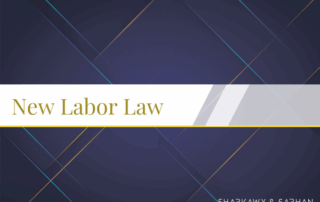1st of March, 2014
Privatization of Beni Suef Cement Company Conformed to the Law
Keywords: Infrastructure & Projects, Commercial
The seventh circuit of the Cairo administrative court has upheld on 15 February 2014 the privatization of Beni Suef Cement Company (BSCC) and ordered the reinstatement of all employees who opted into an early retirement program adopted by BSCC after its privatization. A news update concerning which was sent out by our firm on 17 February 2014.
The verdict is based on several fundamental principles, including:
- The administrative decision by the Ministerial Committee for Privatization to sell a company is distinguished from the privatization contract, and such a decision may be contested before administrative courts, even if the privatization contract includes an arbitration clause.
- Companies of the Public Business Sector (organized by law no. 203 of 1991) are private juridical persons, and therefore the sale of a public business sector company (such as BSCC) by the holding company that owns it is not subject to the Tender Law no. 89 of 1998, which only applies to ministries, public authorities, etc.
- The procedures of the law on the Public Business Sector governing privatization were followed for the privatization of BSCC, and therefore there are no grounds for annulling the privatization.
The court however has concluded that the obligation to keep the employees of the company stipulated for under the privatization decree and the privatization contract was breached. The court, therefore, ordered the reinstatement of all departing employees since 1999 and ordered that the employees receive all their dues as if they never departed from the company, minus any amounts they have received from BSCC since then as compensation for early retirement. This verdict comes in contrast to a string of verdicts by administrative courts striking down privatizations of several formerly public sector companies since 2011, where in most of such cases, the court has concluded that there were significant indicators of corruption and/or the procedures of the law on the Public Business Sector concerning privatization were not followed.
The verdict is based on several fundamental principles, including:
- The administrative decision by the Ministerial Committee for Privatization to sell a company is distinguished from the privatization contract, and such a decision may be contested before administrative courts, even if the privatization contract includes an arbitration clause.
- Companies of the Public Business Sector (organized by law no. 203 of 1991) are private juridical persons, and therefore the sale of a public business sector company (such as BSCC) by the holding company that owns it is not subject to the Tender Law no. 89 of 1998, which only applies to ministries, public authorities, etc.
- The procedures of the law on the Public Business Sector governing privatization were followed for the privatization of BSCC, and therefore there are no grounds for annulling the privatization.
The court however has concluded that the obligation to keep the employees of the company stipulated for under the privatization decree and the privatization contract was breached. The court, therefore, ordered the reinstatement of all departing employees since 1999 and ordered that the employees receive all their dues as if they never departed from the company, minus any amounts they have received from BSCC since then as compensation for early retirement. This verdict comes in contrast to a string of verdicts by administrative courts striking down privatizations of several formerly public sector companies since 2011, where in most of such cases, the court has concluded that there were significant indicators of corruption and/or the procedures of the law on the Public Business Sector concerning privatization were not followed.

Privatization of Beni Suef Cement Company Conformed to the Law
1 March, 2014
Keywords: Infrastructure & Projects, Commercial
The seventh circuit of the Cairo administrative court has upheld on 15 February 2014 the privatization of Beni Suef Cement Company (BSCC) and ordered the reinstatement of all employees who opted into an early retirement program adopted by BSCC after its privatization. A news update concerning which was sent out by our firm on 17 February 2014.
The verdict is based on several fundamental principles, including:
- The administrative decision by the Ministerial Committee for Privatization to sell a company is distinguished from the privatization contract, and such a decision may be contested before administrative courts, even if the privatization contract includes an arbitration clause.
- Companies of the Public Business Sector (organized by law no. 203 of 1991) are private juridical persons, and therefore the sale of a public business sector company (such as BSCC) by the holding company that owns it is not subject to the Tender Law no. 89 of 1998, which only applies to ministries, public authorities, etc.
- The procedures of the law on the Public Business Sector governing privatization were followed for the privatization of BSCC, and therefore there are no grounds for annulling the privatization.
The court however has concluded that the obligation to keep the employees of the company stipulated for under the privatization decree and the privatization contract was breached. The court, therefore, ordered the reinstatement of all departing employees since 1999 and ordered that the employees receive all their dues as if they never departed from the company, minus any amounts they have received from BSCC since then as compensation for early retirement. This verdict comes in contrast to a string of verdicts by administrative courts striking down privatizations of several formerly public sector companies since 2011, where in most of such cases, the court has concluded that there were significant indicators of corruption and/or the procedures of the law on the Public Business Sector concerning privatization were not followed.
The verdict is based on several fundamental principles, including:
- The administrative decision by the Ministerial Committee for Privatization to sell a company is distinguished from the privatization contract, and such a decision may be contested before administrative courts, even if the privatization contract includes an arbitration clause.
- Companies of the Public Business Sector (organized by law no. 203 of 1991) are private juridical persons, and therefore the sale of a public business sector company (such as BSCC) by the holding company that owns it is not subject to the Tender Law no. 89 of 1998, which only applies to ministries, public authorities, etc.
- The procedures of the law on the Public Business Sector governing privatization were followed for the privatization of BSCC, and therefore there are no grounds for annulling the privatization.
The court however has concluded that the obligation to keep the employees of the company stipulated for under the privatization decree and the privatization contract was breached. The court, therefore, ordered the reinstatement of all departing employees since 1999 and ordered that the employees receive all their dues as if they never departed from the company, minus any amounts they have received from BSCC since then as compensation for early retirement. This verdict comes in contrast to a string of verdicts by administrative courts striking down privatizations of several formerly public sector companies since 2011, where in most of such cases, the court has concluded that there were significant indicators of corruption and/or the procedures of the law on the Public Business Sector concerning privatization were not followed.
Key Contacts
Insights
Disclaimer
The information included in this publication/client alert is not legal advice or any other advice. Publications and client alerts on this site are current as of their date of publication and do not necessarily reflect the present law or regulations. Please feel free to contact us should you need any legal advice related to the publication/client alert. Sharkawy & Sarhan (the “Firm”) will not be held liable for any compensatory, special, direct, incidental, indirect, or consequential damages, exemplary damages or any damages whatsoever arising out of or in connection with the use of the data, information or material included in this publication/client alert. This publication/client alert may contain links to third-party websites that are not controlled by the Firm. These third-party links are made available to you as a convenience and you agree to use these links at your own risk. Please be aware that the Firm is not responsible for the content or services offered by and of third-party websites, links as included in the Newsletter nor are we responsible for the privacy policy or practices of third-party websites links included therein.
Authorization of Use
The data, information, and material included in this publication/client alert are solely owned by the Firm. All rights related are reserved under the laws of the Arab Republic of Egypt. No part of this publication/client alert can be redistributed, copied, or reproduced without the prior written consent of the Firm.



